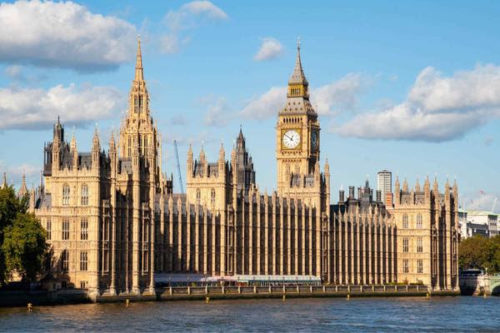This week, we explore the notion of resurrecting/restoring things from the past. When should buildings be restored, and when allowed to decay? Should a species ever be brought back to life when extinct? And should “dead” languages be spoken again? Click here to get a powerpoint with these images.
Warm-up question
What from the past would you want to bring back? (Could be a food, a building, a creature, a custom…)
Stimulus 1: The Houses of Parliament
The Palace of Westminster, the seat of UK legislators, is some 170 years old and needs restoring. Invite guesses of the estimated cost – it’s up to £22 billion.

Should we restore the houses of parliament?
If yes, what makes them worth preserving?
If lots of the materials have to be replaced, is it still the same building?
What if it were cheaper to preserve them in virtual reality instead?
Stimulus 2: Extinct Species
It may become possible, using preserved DNA, to revive extinct species or creatures very like them: the wooly mammoth, the Tasmanian Tiger (a carnivorous marsupial) – perhaps even another human species, Neanderthals.

When, if ever, should de-extinction happen?
Does it make a difference if we caused the extinction, or if it was “natural”?
Was the extinction of homo neanderthalensis “natural” or “man-made”?
Stimulus 3: Dead Languages
The most famous example of a resurrected language is Hebrew which went out of conversational use around the end of the Roman period before being redeveloped as the national language of Israel after WWII. Although modern Hebrew is not the same as biblical Hebrew.
Another interesting example is one of the many indigenous languages of Australia, such as Barngarla. That language died out in the 1960s but has been revived since 2011 using documents from 170 years ago. “Died out” may be a euphemism here – “linguicide” may be the right word- see barngarlalanguage.com

What is lost when a language dies?
Should we try to bring dead languages back to life?
If a language has been deliberately suppressed, does that impose a duty to bring it back?
Should we try to preserve dying languages? Is there a difference?
Overall Thematic Questions
What is the value of putting things back as they were?
When should/shouldn’t we try to turn back the clock?
Best wishes,
Jason
P.S. Lots of enquiries coming in now for training and workshops after the long period of uncertainty. Please book early, especially for activities week workshops in June/July and for INSETs in the first few weeks of September. Apologies if you are waiting for a response from me about something at the moment – on “light duties” while getting through a mild dose of COVID.